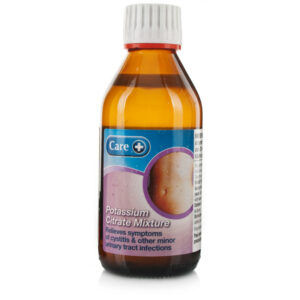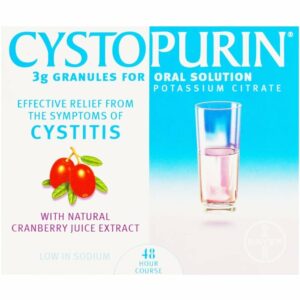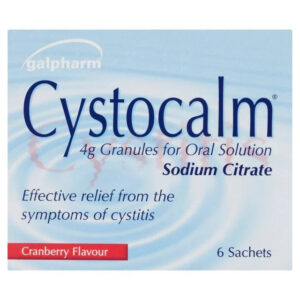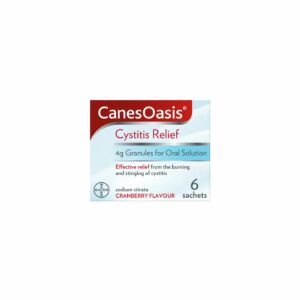Cystitis - Non Prescription Medication
Over-the-counter cystitis medication provides relief for the symptoms and underlying causes of cystitis, a common bladder inflammation typically linked to urinary tract infections (UTI). Read More…

-

Potassium Citrate Mixture 200ml
- Effective Cystitis Relief
- Active Ingredient: Potassium Citrate
- For Short-Term Use Only
£4.09 Select options -

Cystopurin Cystitis Relief Sachets – 6 Sachets
- Helps Relieve Symptoms Associated With Cystitis
- Active Ingredient : Potassium Citrate
- Next Day Delivery Available
£6.98 Add to basket -

Cystocalm Cystitis Relief – 6 Sachets
- Helps Relieve Symptoms Associated With Cystitis
- Active Ingredient : Potassium Citrate
- Results Show In Just A Few Hours
£2.99 Add to basket -

Aqua-Ban Tablets – 30 Tablets
- Eliminates Excess Water
- Active Ingredient : Ammonium & Caffeine Anhydrous
- Buy With Confidence From Registered UK Pharmacy
£4.79 Read more -

Canesoasis Cystitis Relief Sachets – 6 Sachets
- Helps Relieve Symptoms Associated With Cystitis
- Next Day Delivery Available
- Buy With Confidence From Registered UK Pharmacy
£7.49 Add to basket
-
About the Condition
Cystitis is a condition characterised by the inflammation of the bladder, often caused by a urinary tract infection (UTI). It’s particularly common among women, more often than men due to anatomical differences. In women, the urethra is shorter and closer to the anus, making it easier for bacteria to enter the bladder and cause infection. The condition can present several symptoms, such as discomfort or pain when urinating, a need to urinate more frequently, and urine that appears dark, cloudy, or strong-smelling. In some cases, cystitis can lead to a high temperature, feeling unwell, or even signs of a kidney infection, which requires prompt medical attention.
-
Symptoms
Common symptoms of cystitis in women include:
Pain or burning sensation during urination
Frequent urge to urinate, even if the bladder is not full
Cloudy, dark, or strong-smelling urine
Discomfort or pressure in the lower abdomen
Feeling unwell or fatigued
Blood in the urine (in more severe cases)It’s important for women experiencing these symptoms to seek medical advice, as untreated cystitis can lead to more serious complications.
-
Diagnosis
The diagnosis of cystitis typically involves a healthcare provider evaluating your symptoms and medical history. To confirm the diagnosis and plan treatment, the following tests may be recommended:
Urine Analysis: A small sample of urine is collected and examined for signs of infection, such as the presence of bacteria, blood, or pus. If bacteria are detected, a urine culture may be conducted to identify the specific type of bacteria causing the infection.
Imaging: While not always necessary, imaging tests like X-rays or ultrasounds may be used in certain cases to identify other potential causes of bladder inflammation, such as tumours or anatomical issues.It’s important to consult a healthcare provider if you experience symptoms of cystitis, as they can provide an accurate diagnosis and appropriate treatment plan.
-
Treatments
Over-the-counter cystitis medications can provide relief from the symptoms of cystitis. These medications typically contain potassium or sodium citrate, which work by making the urine less acidic, easing discomfort during urination.
Highlighted over the counter treatments:
Potassium Citrate Mixture 200ml: This liquid solution helps relieve the discomfort caused by cystitis and is suitable for short-term use.
Cystopurin Cystitis Relief Sachets – 6 Sachets: These sachets, which include natural cranberry juice extract, are intended to alleviate cystitis symptoms.
Cystocalm Cystitis Relief – 6 Sachets: This is another sachet option that provides symptom relief and contains sodium citrate.
Aqua-Ban Tablets – 30 Tablets: While not specifically for cystitis, they help reduce water retention, which some individuals may find beneficial during a cystitis episode or other related conditions.If symptoms persist beyond a few days or are severe, it’s important to consult a healthcare provider for potential prescription antibiotics or further treatment. These over-the-counter remedies are often a first step in managing mild symptoms at home.
-
Prevention Strategies
To help reduce the likelihood of cystitis, you can follow several practical steps:
Maintain Good Hygiene: Wipe from front to back after using the toilet to prevent spreading bacteria to the urethra. This is particularly important for women, as their urethral opening is close to the anus, which can harbour bacteria like E. coli.
Stay Hydrated: Drink plenty of fluids, particularly water, to help flush bacteria from the urinary tract. Aim for at least 6-8 glasses of water a day.
Urinate Regularly: Avoid holding urine for long periods, as this can encourage bacterial growth. Urinating frequently can help eliminate bacteria from the bladder.
Choose Breathable Underwear: Opt for cotton underwear that allows for better air circulation and can help prevent moisture build up, which is conducive to bacterial growth.
Avoid Irritants: Some substances can irritate the bladder and increase the risk of infection, such as bubble baths, scented soaps, and vaginal deodorants.It’s also wise to consult a healthcare professional if you experience frequent or severe infections, as there might be an underlying condition that requires medical attention.












